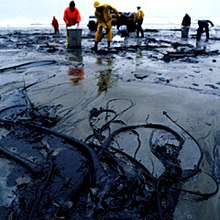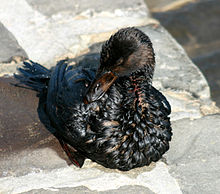Oil spill
An oil spill is the release of a liquid petroleum hydrocarbon into the environment. Oil from ships and oil tankers can spill onto the sea water and pollute the water.



Oil poisons and harms the aquatic organisms and seabirds. The fur of sea mammals and the feathers of seabirds can be damaged by the oil. The animals may suffer, and the effect may be fatal for them.
When birds get soaked in oil, they can't fly and they can't go in water.
Most often the term is used for marine environments, where coasts, lakes, rivers and oceans are polluted. There are three main ways to combat such pollution once it has occurred:
- Use of barriers to limit the pollution to a given zone.
- Skimming of the oil with specially constructed ships
- Chemical dispersion of the oil
- Controlled burning of the oil
- Bioremediation, using microogranisms that consume the oil or oil-related products
An oil spill can not only affect the coasts, lakes, rivers, and oceans but also the environment and the ecosystems. Many animals could get injured and later die without help. Also all the vegetation could be affected by the oil.